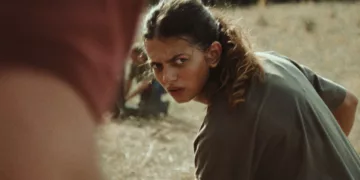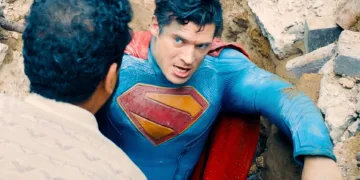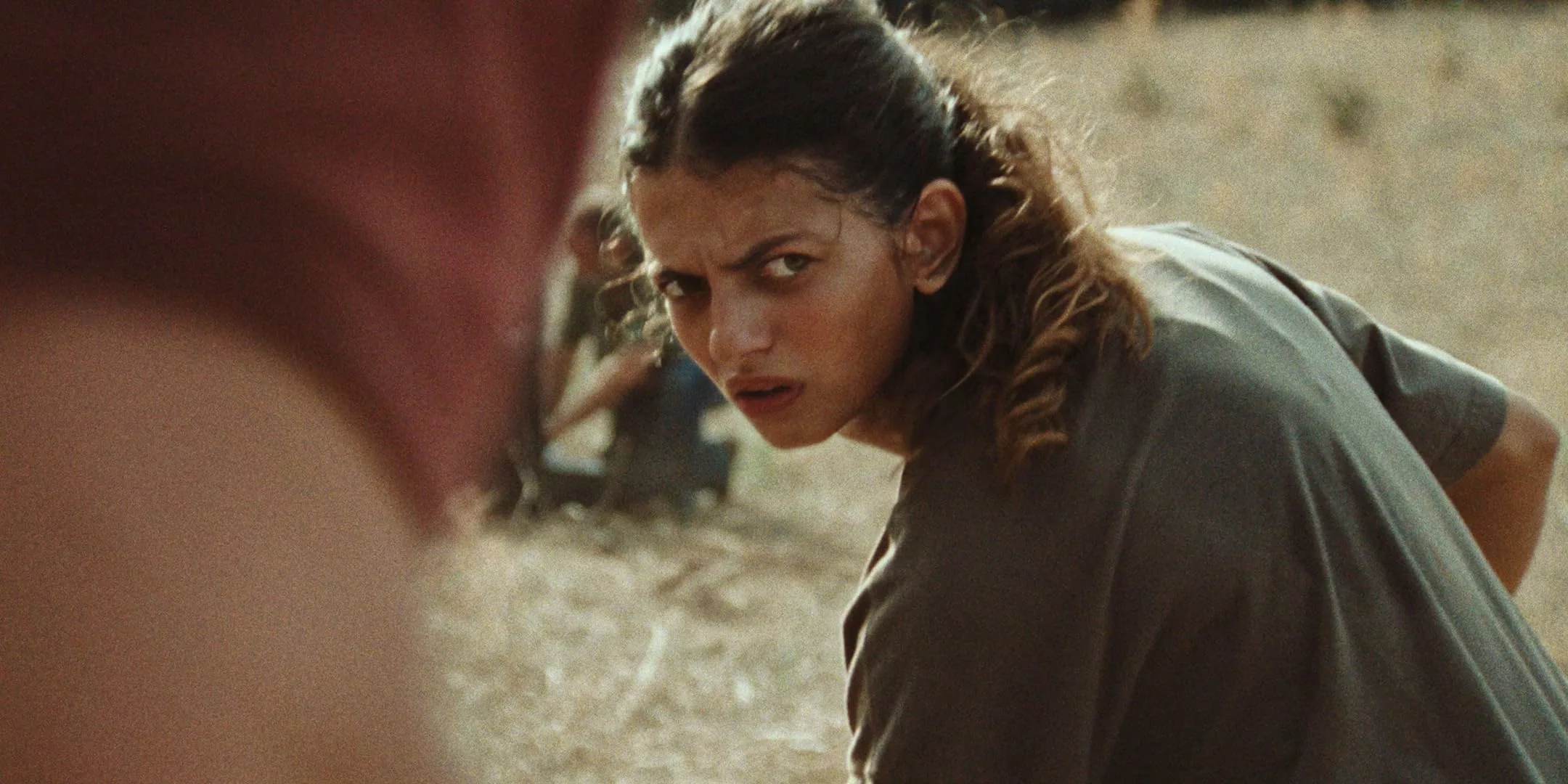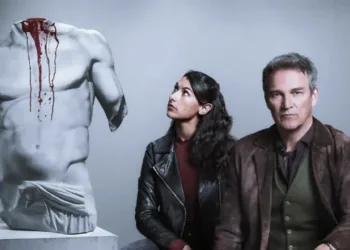It’s the summer of 1995 on the French Mediterranean island of Corsica. For many teenagers, this means lazy days at the beach, but not for 15-year-old Lesia. She leads a complicated life, with her mother passing and her father, Pierre-Paul, hiding from enemies. He’s the head of a powerful criminal organization on the island embroiled in gang wars.
When a political ally of Pierre-Paul’s is targeted in a car bombing, tension rises across Corsica. Pierre-Paul goes into deeper hiding at a remote villa, bringing Lesia to stay with him despite her reluctance. She misses her normal life with her aunt and friends. But Lesia soon realizes this intense situation is part of her family legacy, whether she likes it or not.
As attacks escalate, father and daughter are drawn closer together in a desperate game of survival. Director Julien Colonna immerses us in their world through Lesia’s eyes, via newcomer Ghjuvanna Benedetti’s captivating performance. Born and raised in Corsica, Colonna ensures an authentic depiction of the local culture and criminal underworld.
The tight timeframe and mounting threats ratchet up suspense as Lesia comes to see not only her father’s humanity but also his dark side. Their desperate flight across the island plays out like a crime thriller. Yet this deep exploration of a daughter’sinitiation into her father’s dangerous life makes for a uniquely personal story of familial love against the backdrop of organized violence.
Life on the Run
Corsica in the 1990s was a turbulent time. The island has long had strong nationalist sentiments, desiring autonomy from mainland France. Various independence factions sometimes resort to violence in pursuit of their ambitions. Meanwhile, organized crime syndicates grew increasingly powerful on the island. By the mid-90s, these criminal networks were engaged in all-out warfare for control.
It’s against this backdrop that we meet 15-year-old Lesia. She lives with her aunt on the coast, appearing at first to be a typical teen. But Lesia harbors a big secret: her father, Pierre-Paul, is the head of one of Corsica’s dominant crime families. As a wanted man, he’s constantly on the run from enemies and the police. Lesia rarely sees him, instead spending time with him occasionally during a short, hidden rendezvous.
When the film opens, Lesia has just finished secondary school for the summer. She finds fleeting moments of normalcy—hanging at the beach with friends, an innocent romance with a local boy. However, a dark cloud looms over her life. The volatile dynamics between the underground criminal powers mean Pierre-Paul is always one step ahead of danger.
On the day Lesia planned to meet her beau, everything changed. Her aunt suddenly whisks her away to a remote villa, where Lesia discovers her father and his right-hand men are holed up. They’ve come under threat from rival clans escalating their hostilities. From here on in, Lesia will be drawn deeper into her father’s world of violence and paranoia. Her idyllic summer plans are shattered, and life on the run alongside Pierre-Paul is now her grim reality.
Uneasy Alliance
When Lesia is abruptly brought to her father’s safehouse, she isn’t pleased to have her summer plans disrupted. Pierre-Paul and his men are holed up in the isolated villa due to growing threats from rival clans. On the surface, Lesia seems accustomed to this mobile lifestyle with her dad. But a simmering restlessness in the young girl hints at a desire for stability.
Tensions at the villa are already high. A car bomb nearly kills an ally of Pierre-Paul’s crew. This brazen attack triggers a cycle of retribution between the gangs. With no solid leads, suspicions fall on all sides. Lesia knows to keep a distance from such volatility in her father’s business. Though kind to her, his hard-core soldiers are still a frightening bunch.
As the body count rises, Pierre-Paul takes added precautions. Lesia must stay cooped up and is barred from contacting the outside. Bored and missing her friends, she risks using the villa’s phone after the crew departs one day. Lesia lies about making the call from a public booth, wishing to calm her aunt’s worries. But this fateful mistake has serious consequences.
When news arrives of Lesia’s godfather being murdered, Pierre-Paul realizes their location has been exposed. Racing to get ahead of the threats, the group hastily relocates. But enemies have clearly gained ground in the destructive power struggle. In the ensuing days, more of Pierre-Paul’s allies fell victim to gruesome killings.
With each new casualty, the tight-knit crime clan shrinks further. Trust breaks down, as betrayal seems possible from any direction. Lesia sees her father growing ever more paranoid and ruthless in his tactics. She comes to better understand the shadowy subculture that has always separated her from Pierre-Paul. Now more than ever, the teenager feels trapped in her father’s precarious world of criminals and conflict.
Nowhere Left to Hide
With each new life claimed by violence, Lesia and her father find their options shrinking. After their safehouse is exposed, Pierre-Paul hastily relocates the crew. But these temporary refuges offer little protection as the cycle of brutal retaliation escalates out of control.
Pierre-Paul’s hardened gang proves no match for the coordinated attacks. One by one, Lesia watches her father’s most trusted men fall. Grisly news reports deliver each fresh blow, along with lingering doubts over who betrayed their whereabouts. Sheltering with the remaining loyal members, paranoia and frayed nerves threaten to break the group from within.
With so few places left to turn, the real enemy seems less about rival clans than dwindling places to hide. Pierre-Paul resorts to more secretive boltholes as a last resort. But even these isolated spots feel increasingly vulnerable without reinforcements.
A brief respite arises when Lesia and her dad hole up alone in an abandoned camping ground. Away from the others, a rare calm washes over their bond through long talks. Pierre-Paul’s guarded nature cracks as he reminisces without pretense.
Lesia gains newfound respect for the man she has hunted since her youth. Though his ruthless methods stir conflicted feelings, her care for him runs deeper than her fear of his profession. Only together have they managed to stay one step ahead of relentless threats.
As the hunt intensifies and allies disappear, their alliance faces the ultimate test. With no place left to turn, father and daughter must finally confront the true ruthlessness driving this conflict. Survival may depend on embracing the cold instincts that brought them to this desperate moment.
Growing Up Too Fast
Lesia never asked for this life, but with each passing day, it pulls her in deeper. At the villa hideout, she thinks it is a temporary disruption to summer fun. Little does she know how swiftly her carefree youth will shatter.
Each murder ratchets tensions higher, dragging Lesia into her father’s shadowy world, whether she wants it or not. Grisly news reports give a face to the latest casualties, reminding us all that nowhere is safe for long. When assassins strike again, the clan flees in haste.
Now on the run, the threat feels utterly real. With dwindling allies, Lesia witnesses firsthand the full brutality required to survive. No mercy exists in this war; only kill or be killed. Returning a bullet for every bullet, Pierre-Paul accepts nothing less than absolute victory or death.
Yet Lesia also sees her dad’s softer side during stolen moments away from the others. Lingering by his campfire, she learns what drew him to this life and the toll it exacts. More than his daughter, she’s become his only remaining family member and target. Their bond deepens, yet Lesia feels herself hardening too.
A pivotal scene shakes any remaining complacency. Racing headlong into danger, Lesia proves she can be just as ruthless as required. She is not turning back from this path; she leaves childhood behind in a single bloody act. The road stretches long and dark, but Lesia now walks it with clear eyes. She’ll face whatever comes—if not as a girl but as the woman this world demands she become.
Mesmerizing Performances Bring Complex Characters to Life
This film lives or dies on its central performances and what performances they are. From start to gut-wrenching finish, Ghjuvanna Benedetti and Saveriu Santucci keep you rapt as Lesia and Pierre-Paul. Their evolving bond, so beautifully messy and painful, forms the heart amid madness.
Lesia begins wide-eyed, longing only for summer fun cut short. Yet underneath beats steel—a few fifteen-year-olds gut prey with such calm. Through Benedetti’s eyes, we glimpse confusion, fear, and dawning wisdom no child should hold. Each fresh horror chip away at innocence while strengthening resolve. By the end, what remains isn’t a girl or woman but a blend beyond definition, all the more haunting for its complexity.
Her father, too, defies easy labels. As clan boss, he strikes fear, yet as father, he bears sole concern for Lesia’s safety. When together, Santucci conveys quiet affection and protection amid peril. But alone, his cold calculation chills the soul. Two men war within, and both must kill or meet death; there is no third way left in this world they inhabit.
Their bond retains warmth even as reality’s chill seeps deeper into Lesia’s core. In lingering glances and rare tender talks, their love persists though all else crumbles, a lone bright spot in encroaching darkness. These award-worthy performances are a gift, breathing nuanced, sympathetic souls into characters who, in lesser hands, might become caricatures. Through deft portrayals of two souls’ evolution under pressure, Colonna spins tragedy into a small triumph, finding light where once it was merely shadows.
Capturing the Rawness of a Mob World
Right from the sun-dappled opening scenes, Colonna transports us to a Corsica we can feel in our bones. Its rugged coastlines and dense forests seem to crackle with danger left unsaid. Each rocky inlet and forest glade carries memories that even townsfolk dare share only in whispers.
Into this atmosphere he draws us, seeing all through Lesia’s eyes. When violence erupts, it does so with terse efficiency. We watch from the edges, grasping its impact on Lesia before the full horror registers. In less deft hands, such scenes could overwhelm. Instead, they deepen our lead’s comprehension, and our own, of the world she’s born into.
Colonna lets no shock value distract from brutal truths. His direction holds us in suspense through stillness, faces that speak volumes, and the space left for troubled minds to wander. Rarely has a setting been so enhanced that a story or a character’s journey seemed so intensely personal.
Benedetti and Santucci shine in roles that could crumble in less authentic hands. Their bond, troubled but steadfast, anchors us even as all else shifts. Around them orbit men as dangerous as they are dedicated, real to the last cigarette. When violence comes, it does so with visceral impact yet no excess; its aftermath leaves scars on the audience too.
In her spare but evocative work, Colonna brings to life a world most viewers only know from headlines. He does so with empathy for all caught in its grips and a keen eye for how its rawness can shape living, breathing souls in the most unexpected of ways.
The Initiation of an Audience
Right from the sun-dappled start, this film pulls us deep into Corsica’s rhythms and realities. Colonna wastes not a frame, soon immersing us in places and people Lesia’s lived with for years. Through her eyes, we absorb this life anew, seeing the raw truths behind the headlines.
But where some may show bloodshed for spectacle, here each act rings with care for character. Violence comes not from our invitation but from Lesia’s growing knowledge. We share her journey, learning step by step about a parent’s true calls and costs.
By the journey’s end, have we found easy answers? None—only empathy for lives too complex to judge rashly. Yet Lesia’s initiation also becomes our own. Her eyes, so aged beyond years, linger with viewers long after credits roll. In sparing yet masterful hands, Colonna crafts a drama to initiate us all.
His gifts leave hope that Corsica’s children may find futures beyond this film. Yet in portraying life here as so achingly human, he honors all trapped within such conflicts, not of their making. For any director, what richer gift than stories stirring not lust for blood but will to understand our shared fragilities? This initiation may shape futures yet, on screen and off.
Finding Humanity in Hidden Places
This film left me thinking for a for a long time. Colonna gives us no easy answers, just compelling characters navigating lives far from simple. Lesia especially—her journey moves in stayed, thoughtful ways.
We feel Corsica’s rugged beauty, but tensions are rarely shown. Colonna avoids sensationalizing crime yet immerses us deeply. Through Lesia, we see past headlines about people and strains any place might know. Her dad, especially—how she sees in him what others can’t.
True performances shine through. Lesia and Pierre-Paul feel real as neighbors, their bond carrying more weight than any plot. It’s to Colonna’s great credit that we walk away feeling we understand, if not judge, them.
For those seeking works exploring humanity, however hidden, this surely delivers. Colonna finds in “genre fare” a means to start conversations worth having. Any viewer left pondering—as all the best dramas do—will find this time well spent. Its reminders of our shared fragilities deserve a wide audience. I expect we may yet hear more from its gifted storyteller.
The Review
The Kingdom
Through spare but insightful portrayals, The Kingdom tells an impactful story of familial love against society's harshest edges. Colonna's assured direction finds truth in each character, avoiding sensationalism but crafting a narrative sure to linger with viewers. This accomplished debut bodes well for its writer-director and deserves appreciation from those who value intimate dramas bursting with authentic humanity.
PROS
- Nuanced character portrayals, especially of Lesia and Pierre-Paul
- Strong sense of authenticity to its Corsican setting and criminal organizations
- Minimalistic yet impactful style of storytelling that immerses the viewer
- Dodges cliches to craft a moving character drama within the crime genre.
CONS
- A slow pace may not appeal to all audiences expecting action-driven plots.
- The ending leaves some questions unanswered and open to interpretation.
- Subtitles may intrude at times for non-French speakers.

















































